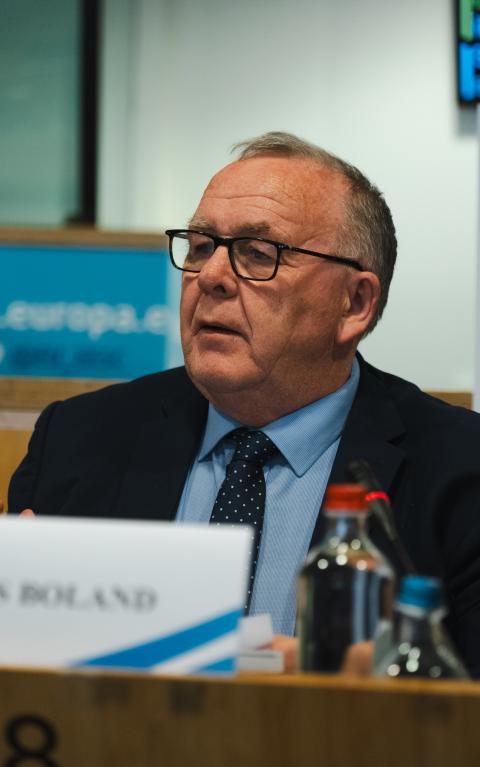European Economic
and Social Committee
Speech by Séamus Boland, conference 'Strengthening civil society and participatory democracy in the EU: the way forward'
Conference on 'Strengthening civil society and participatory democracy in the EU: the way forward', Brussels, 25 March 2024
Dear ladies and gentlemen,
It is my pleasure to welcome you today to this conference of the Civil Society Organisations' Group of the EESC. I am particularly pleased that we have with us VP Pedro Silva Pereira and His Excellency Willem van de Voorde: I very much appreciate your commitment to civil society and that you took time to join us today. You are very welcome. Equally, I am pleased to be joined by Gabriella Civico, president of Civil Society Europe, who will be able to tell you about our cooperation, and Corina Stratulat, Associate Director and Head of Programme at the European Policy Centre, who will guide us through today's discussions.
Before we delve into today's interactive exchange, let me briefly introduce in which context and why we have come together today to discuss ways to strengthen civil society and participatory democracy.
Our societies are undergoing deep and rapid changes. Geopolitical shifts, the changing climate and technological landscape can have the effect of shaking certainties and bring up questions, to which there is sometimes no easy reply. At the same time, governments and institutions are being perceived as distant from the everyday realties of citizens. As shown by the latest Eurobarometer survey on democracy, one in three citizens identify ‘growing distrust and scepticism towards democratic institutions’ as a key threat to democracy.
These challenges make clear that we need to continue investing in our democratic resilience from within, both before and after the EU elections! We need to cherish and protect democracy as a political system, but also invest in strengthening democratic practices.
Citizens and civil society organisations (CSOs) alike are key to identifying creative and sustainable solutions, even to complex questions and challenges. They are capable of finding compromises beyond political short-termism and can bring to the table the voice of vulnerable and under-represented groups.
If we want to harness this potential in an effective, inclusive and transparent way, then we need to recognise the role of CSOs and involve them as part of a structured civil dialogue.
Our Group has long been a strong advocate for meaningful dialogue with CSOs. In the last months, we have worked on two separate initiatives.
- Firstly, in February, the EESC adopted an opinion on Strengthening civil dialogue and participatory democracy in the EU: a path forward. This was requested by the Belgian presidency of the Council of the EU and I am particularly pleased that we have the opportunity to discuss its proposals today in the presence of Ambassador van de Voorde.
In this opinion, prepared Pietro Barbieri as rapporteur and Miranda Ulens as co-rapporteur, the EESC explores the way forward for civil dialogue. In particular, the EESC calls on the EU institutions to take the lead and develop a strategy for civil society, resulting in an action plan. EU institutions should also provide clear standards, provisions or guidelines on principles to make sure that civil dialogue is meaningful and oriented towards results. Let me express my deep thanks and full support to my colleague and Vice-President Pietro Barbieri for his work. You will also hear more from Pietro later this afternoon about dialogue with civil society organisations and citizens and the relationship between these two, which is so far underexplored.
- In parallel, in an open letter together with Civil Society Europe, we have collected 156 signatories from 26 Member States calling for EU institutions to strengthen civil dialogue. The letter encourages EU institutions to take real measures to implement an open, transparent and regular dialogue with civil society in all policy areas. I can see some of the signatories present here today. Gabriella Civico, but also Patrizia Heidegger and my colleague Ionut Sibian will certainly tell you more about our initiative.
To conclude this brief introduction, let me emphasize that today's debate is by no means a point of arrival. Rather, our task is to move from words to action and implement our proposals for an a structured, regular, transparent and inclusive civil dialogue. As a first step in this process, we call for the creation of a working group on civil dialogue, bringing together all stakeholders, and co-creating the blueprints for a more enabling environment for civil society organisations in the policy-shaping process.
Thank you for your attention.
